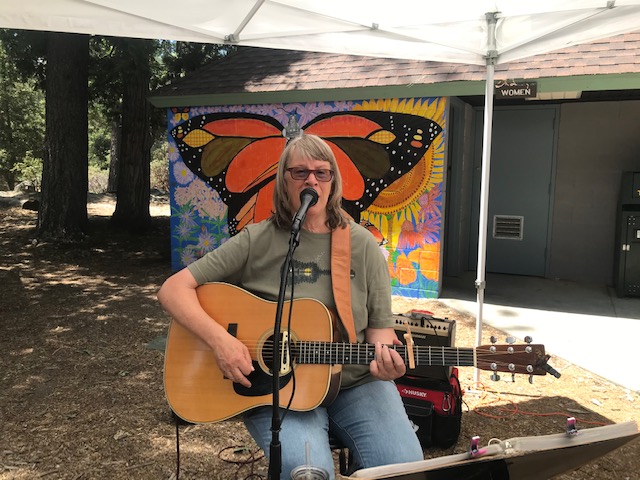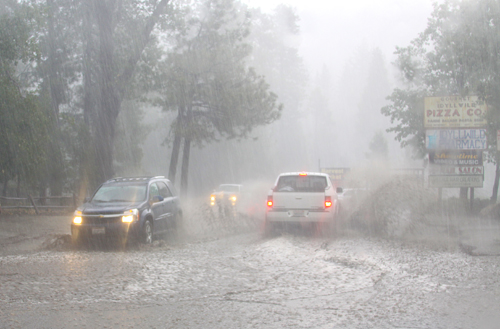Monday, May 1, the Local Short-Term Rental (STR) Committee held a public Town Hall meeting with County 4th District Supervisor V. Manuel Perez. On the stage with Perez were Planning Director John Hildebrand and local STR Committee members Joel Feingold, Woody Henderson, Jon Brown, Anna Duitruk, Mark Dean and Jane Oliver. Members of the Sheriff’s department and code enforcement also were present.
The hall was full. Although public comments were sometimes animated and often elicited response from the crowd, participants did adhere to Perez’ requests for decorum and civility. Members of the committee were clear about their positions on one “side” or another, but also clear about working together respectfully. Almost every statement included an invocation of balance, fairness and equity, even when the speakers seemed to agree about little else but their love for the mountain communities.
Perez’ opening statements promised a “series” of these meetings and acknowledged that for “those of you who live here, those of you that have STRs, those of you have that raised your families here, this is a difficult issue.” Perez admitted that, although aware of the issue on a county-wide sense, the perspective from the Hill is new to him. “Although we have short term rental struggles in the 4th District … in the desert it’s very different from the area up here.”
Brown, an STR owner, provided background on the STR ordinance back to 2016.
Oliver owns the Sunflower Bakery and “bakes stuff.” Her business depends on both locals and visitors. Henderson introduced himself as Fire Safe Council president, and interested in finding middle ground. “In our discussions, which are going well, the county is not considering zoning area limitations or phase-outs upon the expiration of your certificate. All current legal certifications will be protected as long as you own the property. The cap and density limits that we are talking about will only apply to new applications” and will make existing certificates more valuable.
Feingold chose to read a note given to him by “a downtown business owner” who could not be present. “By mixing people that are on vacation into neighborhoods that are designated as residential you are creating a disenfranchised group of citizens. Hotels were positioned in specific areas enabling a place where visitors could stay without having a negative impact on residential neighborhoods, aka the place where citizens live.”
Brown mentioned his 40 years in Idyllwild.” It would be fair to say I’m kind of on the opposite side of Joel here … I come at it from a different point of view. In my view Idyllwild has always been a vacation home community, it’s never been a residential community. Some of us choose to live here … but the reality is that the full-time residents have always been the minority of properties up here … We’re trying to find that happy balance … and address the very real issues that come up.”
Duitruk sits on a board of a few STR associations and is involved in a few nonprofits in the community. “What I am hoping to bring is that knowledge and insight from other communities that have advanced in terms of ordinance and enforcement.”
Dean is president of the Pine Cove Property Owners Association. “I started getting involved because I’m completely surrounded by STRs. I see a lot of good, but I see all the bad too.”
At that point the public was invited to comment on the problems they are experiencing, or good things that have been done. Brown suggesting that speakers not repeat the same concerns but try to cover unheard issues.
Their concerns expressed included noise (exacerbated by geography), parking and uncivil guest behavior. “Whoever comes here has to understand who we are, what this place is. If they can understand that and coexist without interrupting and destroying that which we cherish, from my standpoint they are welcome.”
Investors are running a business in a residential area, selling the peace and quiet of local neighborhoods like a resource they can mine. “They are not local people. Local people care, they respond, they are part of the community.” “The priorities of a business owner are not the priorities of a resident.” There is the sheer number; “I’m just sick of so many people having them all over town.”
Issues came up of equity and the right to profit from owners’ real estate. A moratorium may seem reasonable, but if you have made decisions based on your ability to rent out your property, a yearlong pause in that income may mean losing it was a concern. One speaker told of discovering their permit had expired and could not be renewed. “I called, I wrote letters, I cried, I couldn’t sleep. How could this happen? I purchased this house, everything was done, and now I can’t rent it out.”
Locals who manage STRs take pride in their performance, and say the many should not be punished for the actions of the few: “When I speak to the code enforcement officers, when I speak to the sheriff, when I speak to the people who used to work at the office of the permits, all of them said that it was 1 to 2% io STRs that were a problem. So I would have preferred that we address the problem vacation rentals. I truly believe that, if we had addressed that before, we wouldn’t be here today.”
STRs are part of the larger, volatile housing market. The legal landscape makes being a landlord difficult. Said one homeowner: “I can’t get decent tenants and the long-term rental laws are so screwed up.” STRs seem, to many, a way out. But this decreases the stock of full-time rentals for people who want to live and work on the Hill. This adversely affects businesses that require labor. There is a cyclic nature to the market and it is perhaps an inevitable shortcoming of the slowness of democracy and bureaucracy that we are writing next year’s legislation to deal with the problems of two years ago. One STR manager reported, “In 2020 we were at 70 to 40% occupancy. In 2021 it was higher. We are at 28% occupancy right now.”
How many registered STRs are in our area? How many illegal STRs? How many complaints are there (criminal or otherwise) and do these mostly come from certain properties or managers? Have any of these complaints ever led to fines or other enforcement? Said one part-timer who rents out their cabin: “I’m a little tired of reading Facebook pages where, I’m very sure that it’s impossible, that most of the STRs up here are illegal, which is what I heard just yesterday … If that’s not true please clarify that information. That’s the county’s job.”
This meeting story will continue next week.







